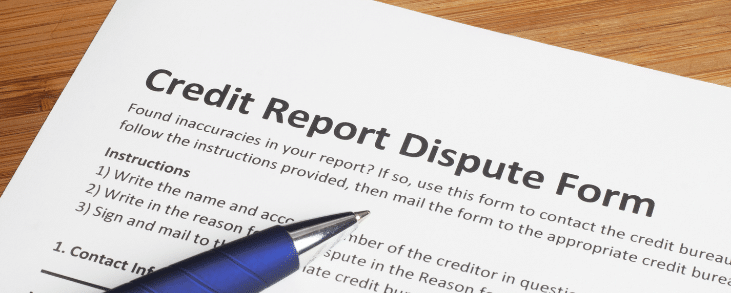According to a recent investigation by Consumer Reports, a third of Americans have errors on their credit reports. If you happen to be one of them, you might be wondering what you can do about it. In that case, writing a credit dispute letter may be best. Put simply, this letter is the first step toward removing the error on your report.
Read below for more information regarding credit report dispute letters. In this article, you will learn what a credit dispute letter is, how it works, and how to write one of your own. Armed with this knowledge, you should have the tools to remove any error from your report.
What is a credit report dispute letter?
A credit dispute letter is a document that borrowers can use to inform the credit bureaus of errors in their credit reports. You can use this type of letter to point out any inaccuracies and request removal.
Once a letter of this nature has been sent, the credit bureau has a set period to reinvestigate the inaccuracies and determine their removal. If the credit bureau agrees with you, they will typically update your report to reflect removing the error, which can significantly increase your credit score.
What kind of errors can be resolved with a credit dispute letter?
Nearly any error or inaccurate information you find on your credit history should be addressed with a credit dispute letter. However, to give you a better idea of what to expect, here is a list of the different types of disputes with creditors that can be handled with a letter like this:
- Accounts opened during cases of identity theft
- A late payment that was actually made on time
- An incorrect address
- A foreclosure or bankruptcy that hasn’t been removed from your report after the appropriate period of time
These disputes may arise from dealing with the original creditor, lender, or a debt collection agency seeking to collect on a debt from you.
How to write a credit dispute letter
Now that you have a better idea of what a credit dispute letter is, the next step is to learn how to write one. Traditionally, consumers would send handwritten credit dispute letters to the credit bureaus. However, these days, it’s much more common to send a typed version through the mail or even to submit the information directly to the credit bureaus themselves through an online submission form.
That said when you’re ready to put your letter together, use the following steps as a template:
Ensure you address it correctly
The most important part of writing a credit dispute letter is making sure that you address it correctly. Without the correct information, workers at the credit bureaus will not be able to access your information properly and help you get the problem sorted out.
As for what information needs to be included in the letter, use the following list as a guide:
- The current date
- Your full name
- Contact information (address and phone number)
- Date of birth
- The last four digits of your social security number
- Your account number
Sample credit dispute letters are found on the Consumer Financial Protection Bureau (CFPB) website.
Then, once you have provided all of your information, the next step is to include the credit bureau’s information. According to the CFPB, you can reach each of the credit reporting agencies at the following addresses:
Equifax Information Services, LLC
P.O. Box 740256
Atlanta, GA 30374
Experian
P.O. Box 4500
Allen, TX 75013
TransUnion LLC
Consumer Dispute Center
P.O. Box 2000
Chester, PA 19016
Explain the error
After you’ve listed the appropriate information, you’ll want to briefly explain your dispute in your letter to the credit bureau. Be sure to explain the specific errors you are disputing and explain why they do not belong on your credit report.
The key here is to keep your explanation short and to the point. This is not the time to go into a lot of detail or to tell a long-winded story. You want to state the facts about the error that you’ve found and why it should not be listed on your report.
Propose a solution
Typically, you’ll be asking the credit bureau to reinvestigate the specific charges or errors on your report that are in dispute. In addition, it’s also important to ask them to remove the errors in question from your credit report entirely.
Include supporting documentation
Lastly, you should also tell the reporting agency that you’ve included documentation to back up your claim. The exact type of documentation that you will need will depend on what type of error you are disputing. You could include payment records, an annotated copy of your credit report, or in the case of identity theft, a copy of a police report as examples of support documentation.
It’s important to note that you should not send original copies of these documents. The credit bureau will not return any documents that you send to them. So with that in mind, be sure to send copies instead.
Finally, the CFPB recommends sending your letter by certified mail so you have a record of delivery to the proper recipient.
The bottom line
After you submit your documentation, either by mail or online, the next step is to wait to hear from their credit bureau about their decision. The Fair Credit Reporting Act (FCRA) says that credit bureaus have 30-45 days to investigate your claim and respond to your letter. At that point, the credit bureau may tell you that they are removing the disputed information from your credit report, ask for more information, or deny your claim.
Remember, you can request a free credit report copy once per year from all three major credit bureaus at annualcreditreport.com.
If you need help with your credit dispute letter, contact us at the Tayne Law Group. We’re here to assist you in getting your debts resolved and questions about your credit. Call us at (866) 890-7337, or fill out our short contact form, and we’ll get in touch!







